Key takeaways:
- Anti-war activism is rooted in moral convictions and aims to redefine conflict resolution through dialogue and compassion.
- The abolitionist movement serves as an inspirational model for today’s activism, emphasizing grassroots organizing, moral clarity, and the power of storytelling.
- The interconnectedness of various forms of oppression highlights the importance of addressing systemic issues in both abolitionist and anti-war efforts.
- Building community through shared experiences and collaboration can empower activism and drive meaningful change.
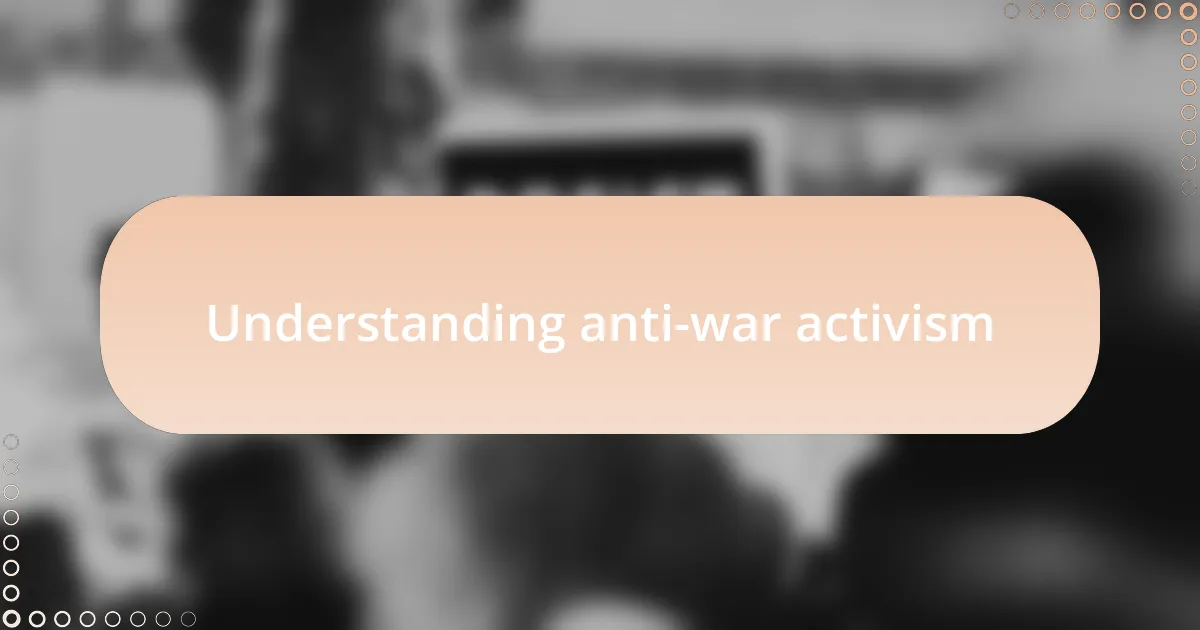
Understanding anti-war activism
Anti-war activism is a passionate movement fueled by deep moral convictions and the belief that peace is attainable. I still remember the first time I attended a rally. The palpable energy in the air was electrifying, filled with people from all walks of life united by a single purpose. It made me wonder, why do we often turn to conflict instead of dialogue?
The history of anti-war activism showcases a relentless pursuit of peace, often at a personal cost. I recall reading about the Vietnam War protests, where individuals risked their safety to stand against what they believed to be an unjust war. This made me reflect on the courage it takes to stand up for one’s values—how far would I go for peace?
At its core, anti-war activism challenges the prevailing narrative that war is an inevitable solution. I’ve pondered how conversations could reshape our perspectives, just as they did for the abolitionists who fought for justice. Isn’t it time we redefine our approach to conflict resolution and prioritize compassion over combat?
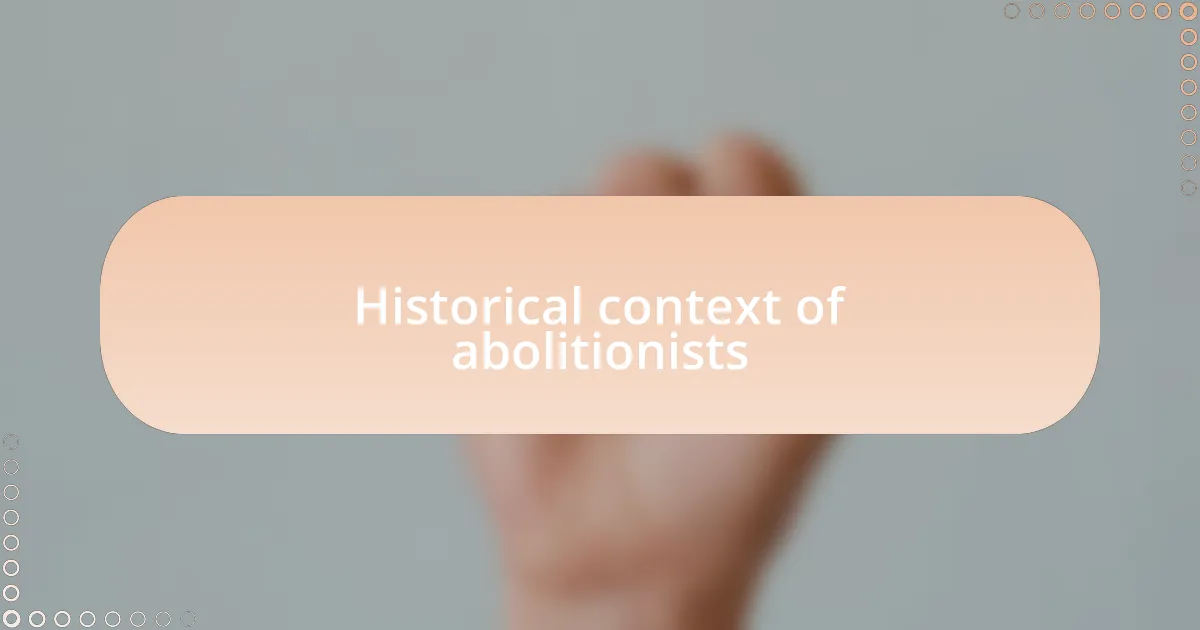
Historical context of abolitionists
The abolitionist movement emerged in the early 19th century, driven by the moral imperative to end slavery in the United States. I often think about the strong-willed individuals who took up this cause, some of whom faced immense backlash. How brave must they have been to confront such a deeply entrenched system of oppression?
During this period, figures like Frederick Douglass and Harriet Tubman became symbols of resistance and hope for many. Their stories resonate with me because they highlight the power of personal sacrifice for a collective goal. I sometimes wonder: could I muster the same courage they showed in the face of danger and discrimination?
The abolitionists didn’t just aim to end slavery; they sought to reshape societal norms around human rights. Their dedication to equality serves as a powerful reminder that activism involves not just a fight but a profound transformation of hearts and minds. It ignites a thought in me: what can we learn from their perseverance as we advocate for peace today?
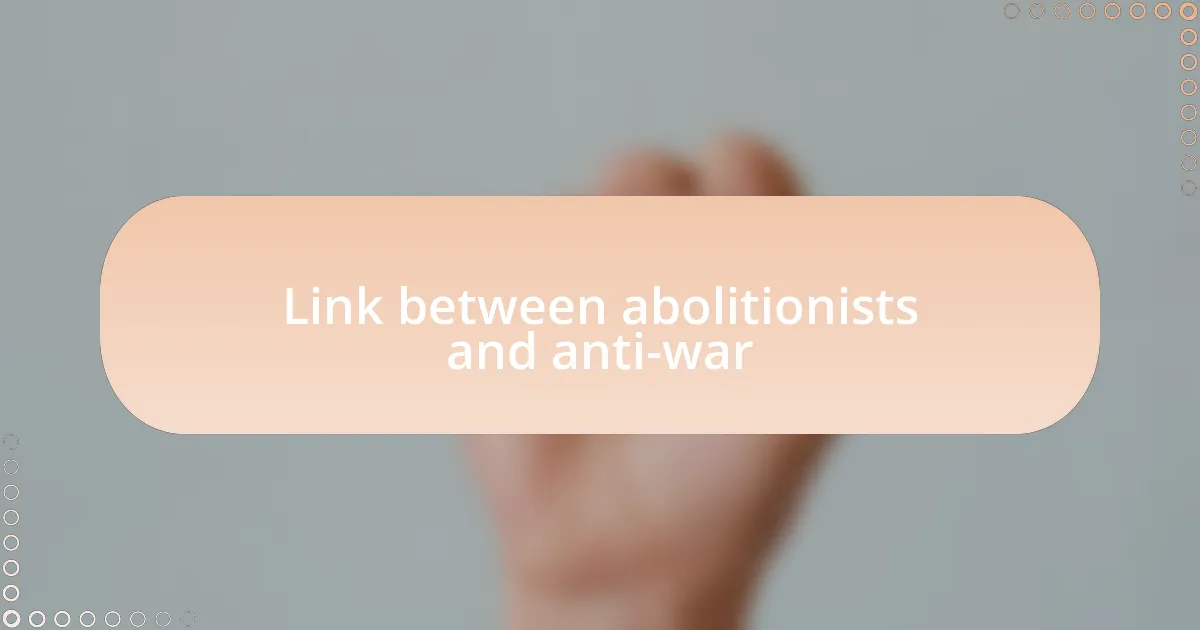
Link between abolitionists and anti-war
The link between abolitionists and anti-war activism runs deeper than just a shared disdain for injustice; it is grounded in the belief that violence begets more violence. As I reflect on the brave abolitionists, I’m reminded of how their efforts against slavery were not merely about freeing individuals but about establishing a framework for peace and equality. Can you imagine the intensity of their conviction in advocating for a society that valued human life above all, especially in a world filled with conflict?
Furthermore, many abolitionists recognized that the same systemic oppression they fought against in slavery often manifested in militaristic nationalism and imperialism. This connection resonates with me because I see parallels in today’s world, where war disproportionately affects marginalized communities. I often ask myself how we can take lessons from the abolitionists’ fight, channeling their courage to speak out against the harm caused by war.
Ultimately, the abolitionists’ struggle illustrates the concept of interconnected oppressions. Their work in promoting a more humane society laid a foundation for anti-war sentiments, urging us to question: what if we viewed every form of violence as a threat to our shared humanity? As I ponder these connections, I feel compelled to continue advocating for peace, drawing from the inspirations of those who paved the way before us.
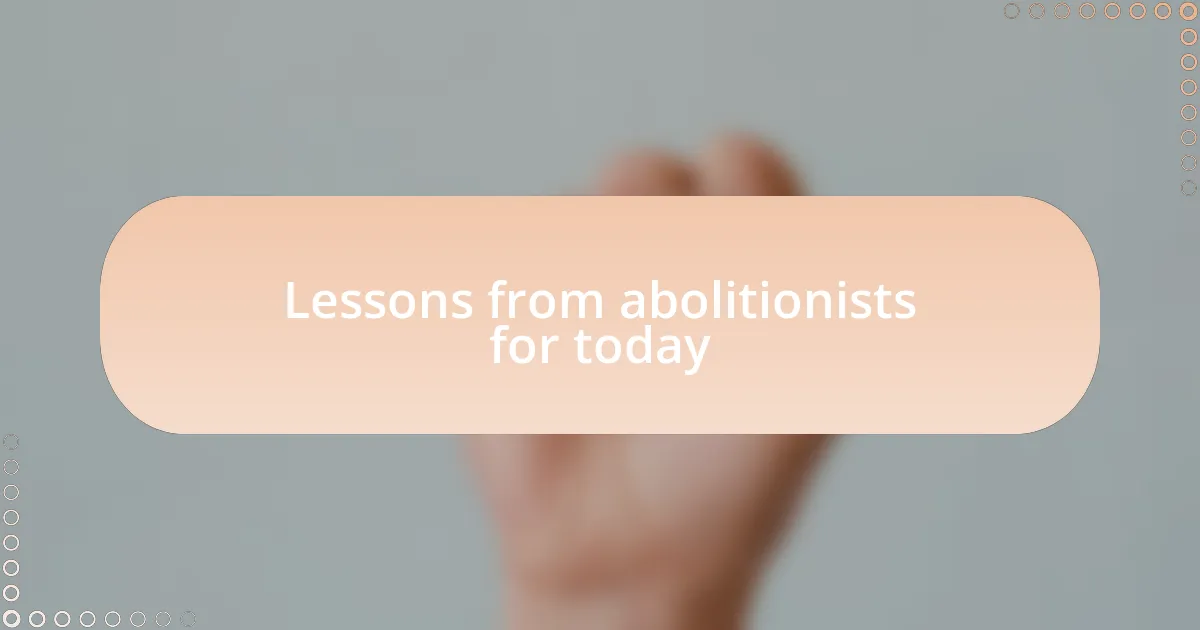
Lessons from abolitionists for today
One powerful lesson from abolitionists is the importance of grassroots organizing. They didn’t wait for permission to act; they built networks, created safe houses, and forged alliances. I remember a community gathering I attended where people came together to discuss local injustice. The energy was palpable, reminding me of the abolitionist meetings I read about. It made me wonder: what could we achieve if we harness that same spirit of collaboration today?
Another key takeaway is the necessity of moral clarity. Abolitionists stood firm in their beliefs, often at great personal risk. I’ve found myself reflecting on this during times of uncertainty in my activism, asking whether I am asserting my values clearly enough. It’s a challenge to remain steadfast, especially when the stakes feel low, but those who fought against slavery teach us that unwavering conviction can inspire others to join the fight for justice.
Finally, abolitionists understood the significance of storytelling. They used their words to humanize the struggle, sharing personal accounts that brought the horrors of slavery into stark relief. I often think about my conversations with friends about the impact of war, and I ask myself how I can tell my own stories in ways that resonate on a deeper level. When we share our truths, it ignites passion and fosters empathy; what stories can I tell to compel others to act for peace?
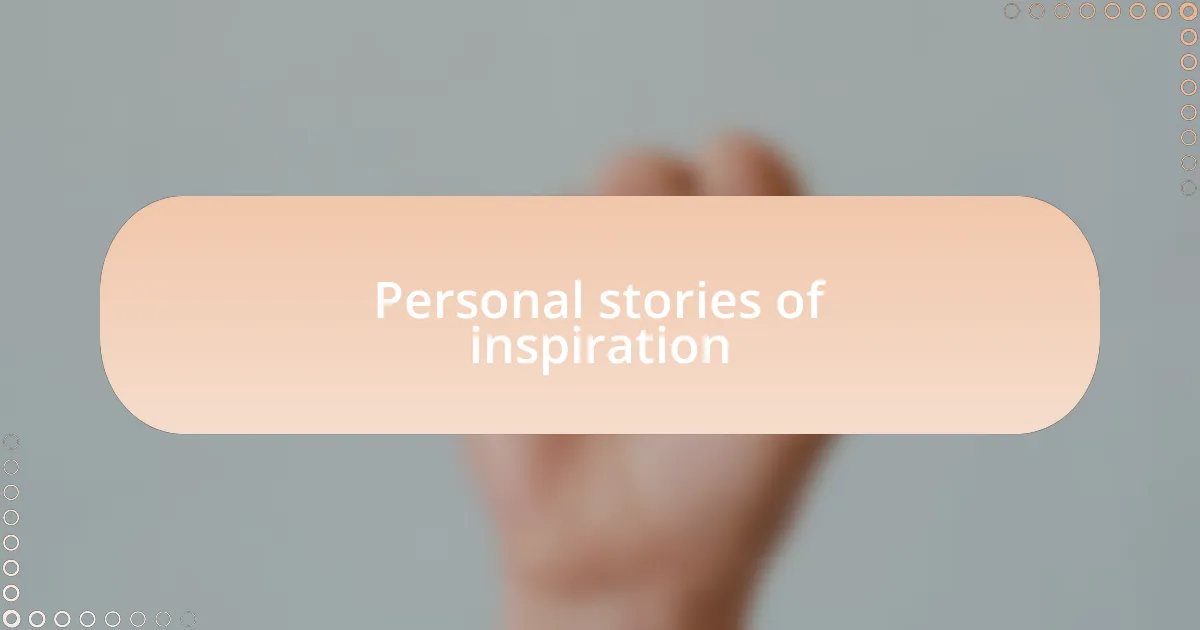
Personal stories of inspiration
I vividly recall a documentary I watched about the Underground Railroad, which featured firsthand accounts from those brave enough to escape slavery. Listening to their stories stirred something deep within me—a realization of the power that personal experiences have in motivating others. I found myself wondering how many people could be moved to action if they knew the real impacts of war through lived experiences rather than statistics alone.
During a recent open-mic night, I took to the stage, sharing a piece about the enduring human spirit in the face of injustice. I was surprised by the audience’s reaction; people approached me afterwards, sharing their own stories. It reminded me of how abolitionists captivated their audiences, weaving narratives that connected hearts to the cause. This exchange of stories illuminated the fact that our individual experiences can forge a community united in purpose.
One poignant moment in my activism journey was when I met a veteran who had been deeply affected by the conflicts he experienced. His vulnerability in sharing how war had haunted him inspired me to reflect on the importance of compassion. It hit me—just as abolitionists sought to bridge understanding through their narratives, maybe our greatest weapon against warfare lies in amplifying these personal stories, revealing the humanity behind the headlines. How can we ensure that these voices are heard and valued in our fight for peace?
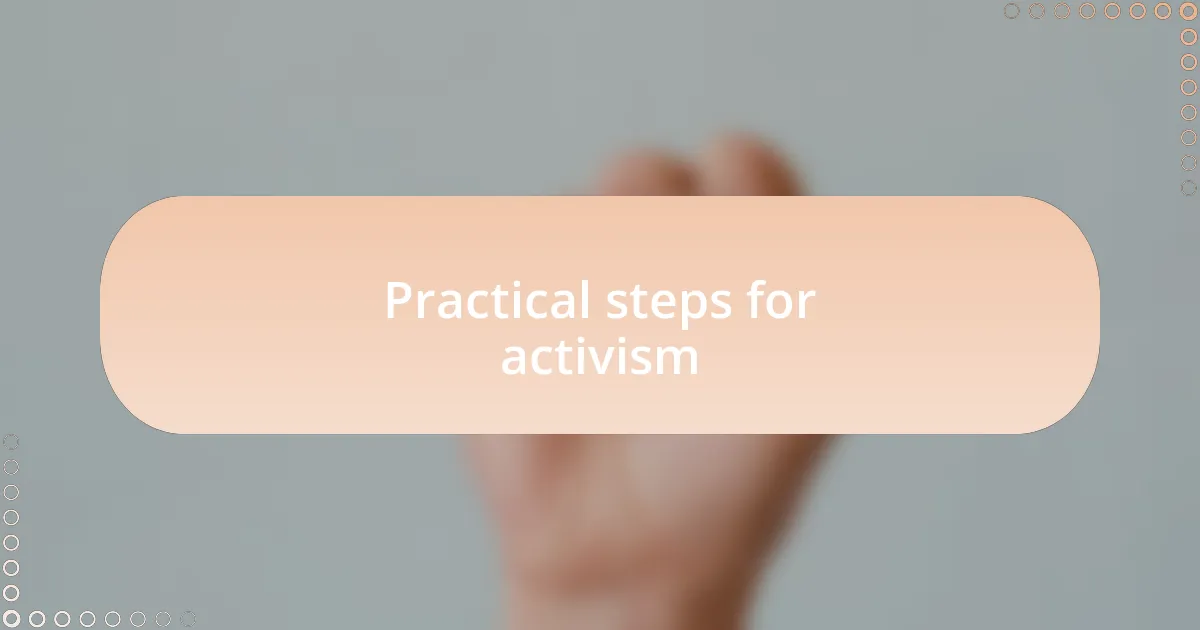
Practical steps for activism
One practical step I’ve found effective in activism is organizing community forums. By creating spaces for dialogue, I’ve witnessed how these gatherings can transform a room filled with strangers into a collective of passionate advocates. At one event, participants shared their experiences related to war and peace, fostering connections that lingered long after the discussion ended. Have you considered how a simple conversation could spark change?
Another approach is to utilize social media as a platform for education and mobilization. I once crafted a campaign sharing weekly facts about the impacts of war on everyday lives, combined with personal anecdotes from veterans and civilians. The result? An overwhelming response as people began to engage and share further, amplifying our collective voice. It’s fascinating how one strong narrative can ignite a wave of support—are you ready to leverage technology in your activism?
Lastly, I encourage partnering with local organizations that align with your cause. When I joined forces with a group focused on veteran support, I gained invaluable insights and access to networks I hadn’t considered before. Their experience in navigating community challenges strengthened our initiatives. How can collaboration enhance your activism and broaden your impact?
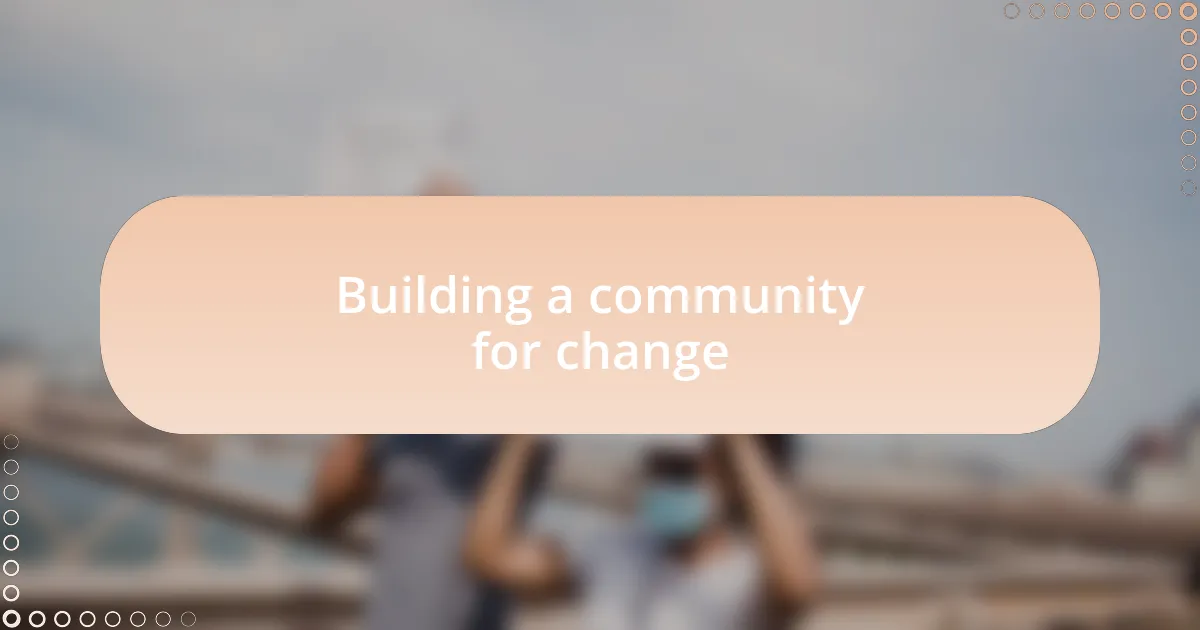
Building a community for change
Building a sense of community is essential in activism. I remember the time I participated in a community cleanup event. What started as a simple act transformed into a powerful gathering of diverse individuals, all united by a common goal. Have you ever experienced that electrifying feeling when strangers come together for a shared purpose? It’s as if a light bulb goes on, illuminating the path for future collaboration.
Cultivating relationships within the community often leads to inspiration and innovation. I once attended a workshop where activists shared their stories and strategies. The exchange of ideas was so energizing that I ended up collaborating on a project that focused on local history and its connection to current war issues. How often do we underestimate the power of shared experiences and creativity? Together, we tapped into something greater than ourselves, pushing boundaries in our fight for change.
It’s crucial to create a space where everyone feels valued and heard. I’ve seen how inviting different voices can challenge assumptions and broaden perspectives. At one gathering, a young activist shared a poem that resonated deeply with many. In that moment, I realized that art and activism can go hand in hand, driving change in ways statistics alone cannot. Are you ready to embrace creativity in your community-building efforts?